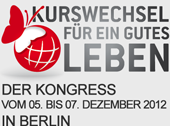International Conference "Changing Course for a Good Life"
With a call to "change course", which links an ecological restructuring of the economy with the expansion of life opportunities and the democratization of society, IG Metall - the German Industrial Union of Metalworkers - intends to add its own conceptual contribution to the broader social debate.






